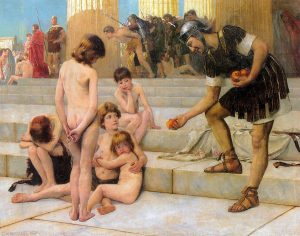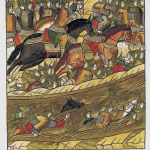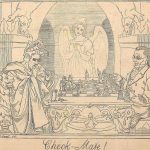As the debate between the Stay Safers and the Open Uppers continues, it seems a better time than most to take a look at what people have done in the past during times of plague and pandemic. Not surprisingly, they did pretty much the same things we’re doing now. Although they knew nothing of pathogens, the instincts of our forebears were to stay away from the plague in every way possible.
Here is a list of reactions that are typical of people dealing with a major pandemic:
- Fear and panic
- Clean up
- Run away
- Restrict inbound travel
- Quarantine the infected
- Practice social isolation
- Practice social distancing
- Break quarantine
- Commit crime
- Pray
These strategies are repeated during all the various plagues from the Black Death in the 1300s through the 1919 flu epidemic and beyond. This is what the human race has had in its pandemic-fighting toolbox then and now.
Drawing from just one example, Florence in the mid 14th century, it’s possible to find most if not all of these practices in play. Boccaccio gives a detailed account in the introductory chapter of The Decameron, a book set in Florence, Italy during the plague year of 1348. Then as now, the plague came “from the East,” carried along trade routes until, making truth of rumor, it landed in Florence in the Spring.
The Florentines had been through this before, and they immediately began cleaning their city, getting rid of as much “filth” as they could to eliminate potential breeding grounds for disease. Travel restrictions went into effect — mostly on incoming ships — to prevent the plague from washing ashore.
To no avail. The disease struck with a vengeance and soon people were dying in the streets. Naturally, quarantines were imposed on any person or household struck by the disease. The word quarantine has its origin during the Black Death, and refers to the 40 days that they believed necessary to disinfect a person who had come in contact with the disease.
Among the healthy, there were several camps: the ones who ran away, the ones who stayed home, and the ones who carried on as (or somewhat more than) usual.
Among those who fled the plague were the wealthy nobles who left the city en masse to wait out the pestilence in their countryside villas. Needless to say, they carried some amount of contagion with them. The tale-tellers of The Decameron are among this group.
The second group was composed of those who tried to stay safe by staying home and hiding from the plague. Boccaccio says it got them too, sometimes whole families living in one house.
The third group included those who felt that since we’re all doomed anyway, we may as well have the best time we can while we’re here. Their motto might have been “Eat, drink, and be merry, for tomorrow we die.”
It also bears mentioning that at least some small proportion of the citizens went to church and prayed, although there seem to have been no formal services. Even then, long before we knew about the causes of infectious disease, we knew about infection.
During today’s pandemic crisis, we have all the personality types represented, and even one more — the live free or die, back to work, business as usual people. This one did not exist in pre-capitalist, feudal Florence.
So to recap, when it comes to government responses, imposing quarantines and averting incoming traffic was typical. In some places, they had guards posted around the city walls as well. The goal, at least in the beginning, was to keep the disease out. Once it was in, the goal was to keep it from spreading. On an individual level, people sought to avoid catching it by running away or hiding at home. Some people partied like it was 1348. You know what they say. It takes all kinds.
Be that as it may, modern people are doing the same things today that we did in olden times, including the wearing of masks — mask wearing by plague doctors began in the 1600s when the earliest forms of PPE were invented. Then as now, no one really wants to get sick and die.
So as much as the Open Uppers want their freedom and as understandable as that is, they’re incorrect if they think there’s anything unusual or strange about trying to stop the transmission of a major epidemic. We’re just doing the same things we always do. As to whether the disease is serious enough to warrant the draconian efforts governments are taking to prevent it, that’s something we’re likely to find out once “lockdown” ends in enough places.






